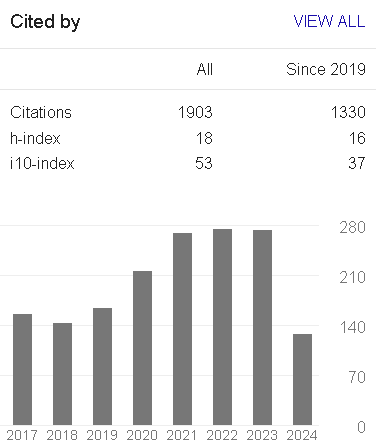A Comparative Study of Various image Steganographic Techniques Used for Information Hiding
Keywords:
Steganography, image steganography, spatial domain, Transform domainAbstract
The staggering growth in communication technology and usage of public domain channels (i.e. Internet) has greatly facilitated transfer data. However, such open communication channels have greater vulnerability to security threats causing unauthorized information access. Traditionally, encryption is used to realize the communication security. Today HTML pages and Spam Emails are also being used for steganography. With the help of steganography we can hide the information which is paramount and confidential for us. Steganography is the art of hiding the fact that communication is taking place, by hiding information in other information. Many different carrier file formats can be used. For hiding secret information in images, there exist a large variety of steganographic techniques some are more complex than other and all of them have respective strong and weak points. Steganography is a technology where modern data compression, information theory, spread spectrum, any cryptography technologies are brought together to satisfy the need for privacy on the internet. This paper intends to give through understanding and evolution of different existing image steganographic techniques of data hiding in spatial, transform and compression domains. It also discusses that which image format is most appropriate or best for our algorithm and how can we perform compression on that.
References
Moerland, T., “Steganography and Steganalysis”, Leiden Institute of Advanced Computing Science, www.liacs.nl/home/tmoerlprivtech.pdf.
Artz, D., “Digital Steganography: Hiding Data within Data”, IEEE Internet Computing Journal, June 2001.
Eltyeb E.Abed Elgabar, Haysam A. Ali Alamin, “Comparison of LSB Steganography in GIF and BMP Images ”, International Journal of Soft Computing and Engineering (IJSCE) ISSN: 2231-2307, Volume-3, Issue-4, September 2013.
Artz, D., “Digital Steganography: Hiding Data within Data”, IEEE Internet Computing Journal, June 2001.
Atallah M. Al-Shatnawi, "A New Method in Image Steganography with Improved Image Quality", Applied Mathematical Sciences, Vol. 6, 2012, no. 79, 3907 - 391.
Priya Thomas," Literature Survey On Modern Image Steganographic Techniques", International Journal of Engineering Research & Technology (IJERT) Vol. 2 Issue 5, May - 2013 ISSN: 2278-0181.
Y. Lee and L. Chen, “High capacity image steganographic model,” IEE ProceedingsVision, Image and Signal Processing, vol. 147, no. 3, pp. 288–294, 2000.
W. Pennebaker and J. Mitchell, JPEG still image data compression standard. Kluwer Academic Publishers, 1993.
Jiri Fridrich and Du Rui. Secure steganographic methods for palette images. In Inter’l Workshop on Information Hiding, pages 47–60, 1999.
Provos, N., Honeyman, P, Hide and seek: An introduction to steganography, IEEE Security & Privacy Magazine 1 (2003) pp. 32-44
E. Franz and A. Schneidewind., “Adaptive steganography based on dithering”, in Proc. Of the 2004 workshop on Multimedia and Security, 2004. pp. 56-62.
Yang et al., “Adaptive data hiding in edge areas of images with spatial LSB domain systems”, IEEE transactions on information forensics and security, vol. 3, no. 3, september 2008.
I.-C. Lin et al, “Hiding data in spatial domain images with distortion tolerance”, Computer Standards & Interfaces 31 (2009) 458–464.
Downloads
Published
How to Cite
Issue
Section
License
Copyright (c) 2015 COMPUSOFT: An International Journal of Advanced Computer Technology

This work is licensed under a Creative Commons Attribution 4.0 International License.
©2023. COMPUSOFT: AN INTERNATIONAL OF ADVANCED COMPUTER TECHNOLOGY by COMPUSOFT PUBLICATION is licensed under a Creative Commons Attribution 4.0 International License. Based on a work at COMPUSOFT: AN INTERNATIONAL OF ADVANCED COMPUTER TECHNOLOGY. Permissions beyond the scope of this license may be available at Creative Commons Attribution 4.0 International Public License.


